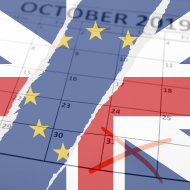
Campaign split across five key areas
The National Office for Animal Health (NOAH) has produced information for the veterinary medicines supply chain to ensure it is prepared for a no-deal Brexit.
Supported by government funding, the campaign summarises the necessary steps animal health businesses should be taking to prepare for Brexit. The advice has been split across five key working areas: Supply, Regulatory, Pharmacovigilance, Cascade and product imports, and EU workers.
“We remain committed to working closely with government and our members and stakeholders to ensure the availability of veterinary medicinal products and services is safeguarded post-Brexit,” said NOAH chief executive Dawn Howard.
“We are hosting seminars throughout the UK and holding webinars to communicate the necessary information to as many animal health professionals and businesses as we can as we work together to ensure business readiness for our Exit from the EU.”
Supply
Almost all veterinary medicines used in the UK come from the EU. As veterinary medicines are classified as category 1 high priority goods by the government, companies are working closely with Veterinary Medicines Directorate (VMD) and the Department of Transport to plan for Brexit and the possible complications that could arise from imports.
These preparations include alternative routes & logistics, trader readiness and establishing appropriate stock levels. To avoid any complications with stock levels, vets, SQPs and other retailers should consider their medicines requirements and order appropriately to maintain stock levels.
Regulatory – product authorisations
All veterinary medicines authorised for use in the UK will continue to be authorised after Brexit and can remain on the market for sale and supply in their existing packaging. Products authorised through the EU (also valid in UK) will automatically have licences converted into UK authorisations. There will be no change to licensed indications for use nor changes to withdrawal periods.
Any future new products authorisations or any changes to existing product licences will need to go through VMD; in the case of a no-deal, EU systems for authorisations will not apply here. Changes to UK packaging and leaflets will take place gradually after Brexit, however, vets and SQPs will still be able to use products with EU Marketing Authorisation details on the packaging.
Pharmacovigilance – reporting suspected adverse reactions
Vets, SQPs and animal owners should continue to report suspected adverse reactions to products to either the VMD or the company (MAH). VMD and MAHs will continue to work together to monitor and maintain product safety.
The cascade and product imports
The VMD will no longer be able to favour EU medicines over those from other countries. For vets to be able to import medicines for veterinary use, only Special Import Certificates (SIC) will be available.
EU workers – settled status
Citizens from the EU, EEA and Swiss citizens should apply for settled status in the UK. British or Irish citizens need not. Depending on the length of residency in the UK, workers who apply will get settled or pre-settled status. If you have EU workers in your business, you can check what they need to do now by visiting www.gov.uk/eusettledstatus.
To find out more information, to learn more about the seminars, please visit www.noah.co.uk/focus-areas/brexit



 The Animal and Plant Health Agency (APHA) has updated its online reporting service for dead wild birds.
The Animal and Plant Health Agency (APHA) has updated its online reporting service for dead wild birds.